





















|
|
Events
March 12, 2015
Organized training program for staff of the Veterinary Directorate and inspectors of the Veterinary Inspection
Within the MIDAS Project and activities in the field of food safety an important segment is to resolve safe disposal of animal by-products After the completion of the Feasibility Study for the safe disposal of animal by products, supported under the MIDAS Project in 2012, it has been started to realize the engagement on Technical assistance for creation of legal framework and administrative and technical capacity-building on management of animal by-products, of March 2014, leaded by the expert Tijmen van de Vuurst (Netherlands). Exactly, in the framework of this assignment, on March 10 and 11, was organized the training for staff of the Veterinary Directorate and veterinary inspectors of the Administration for Inspection Affairs, also attended by representatives of the Ministry of Agriculture and Rural Development.
During this two-day workshop, upon the general introduction to the topic of the by-products of animal origin, to the participants were presented and explained the Checklist for inspection of animal by-products, then the legislation concerning this field, case studies based on practical examples from inspectors. In addition, it is extremely important that the participants had the opportunity for the practical training on site, during the second day, precisely to review the by-products of animal origin in a slaughterhouse (checklist for the investigation of the chain and quantity of ABP in slaughterhouses, cutting and de -boning plans and meat processing plants).
The issue of resolving disposal on ABP represents not only an activity that through the project we strive to establish and improve, but more broadly, it is a matter of importance for Montenegrin agriculture (food safety, animal health).
Questions and discussion followed the workshop.
Presentations from the workshop can be downloaded here, and also take a look at a few photos from the workshop and visit to the slaughterhouse.
  
May 7, 2014
Organized workshop for Register of agricultural house holdings
Within the MIDAS project and in organization of the Ministry of Agriculture and Rural Development, the workshop for the Register of agricultural house holdings was held for the Extension Service for Plant Production and Livestock Selection Service, as well as for the staff of the Ministry of Agriculture, in the premises of the old Government’s building in Podgorica.
The workshop was opened by the Assistant Minister Mr. Blagota Radulovic, who briefly explain in his welcoming and opening remarks the Register of agricultural house holdings, what is the process and which activities will take place in the future in this area. After the opening speech, about the activities related to the Register of agricultural house holdings, its legal basis, the method of entry in the Register and the documents that will be needed to fill in during the registration of producers, the present participants were introduced by the officer of the Ministry of Agriculture, who is responsible for activities associated to the Registry within the department for databases. Extension services and representatives of the Ministry of Agriculture were thoroughly introduced with the upcoming tasks that await them on-the-spot and during the registration of agricultural producers. The opportunity to hear and to be introduced with the more detailed information on the need to establish the Register will have farmers, during the planned visits to the municipalities, within the info campaign that will be leaded by the Ministry of Agriculture. The Register will be the basis for realization of future subsidies and support that can be achieved by the Montenegrin farmers.



April 1, 2014
Educational workshops for food business operators to meet the general and specific hygiene requirements in the facilities for production and distribution of food of animal origin
Within the MIDAS project and expert engagement “Technical assistance on establishing criteria for categorization of food establishments, identify priorities and increase awareness of food business operators for upgrading food establishments in Montenegro, in line with EU standards”, and in the organization of the Ministry of Agriculture and Rural Development and Veterinary Administration, on April 1, 2014, the educational workshops for food business operators to meet the general and specific hygiene requirements in the facilities for production and distribution of food of animal origin was held in the old Government’s premises in Podgorica.
The workshop was opened by the Assistant Minister of MARD Ms Danijela Stolica, who briefly introduced all participants, after the welcome speech, with the current situation and the efforts of the Ministry of Agriculture to harmonize legislation in this area in line with the EU requirements, which is certainly expected of Montenegro on its way to the membership. The present representatives of institutions and business entities from Montenegro were also welcomed by the Director of the Veterinary Administration Ms Biljana Blečić, who emphasized the importance of educational workshops in the future work of all food business operators in connection with the fulfillment of general and specific hygiene requirements in the facilities for production and distribution of food of animal origin.
Leading of the workshop was subsequently continued by the expert Mr.
Alberto Mancuso, who are engaged under the MIDAS project for the needs of the Ministry of Agriculture and Rural Development and technical assistance on establishing criteria for categorization of food establishments, identify priorities and increase awareness of food business operators for upgrading food establishments in Montenegro. This Expert introduced the present participants with his tasks in Montenegro, as well as with current situation and the need for action in order to meet the required criteria for the food business operators in Montenegro.
This workshop was attended by almost 100 participants from the Ministry of Agriculture and Veterinary Administration who received certificates of participation.
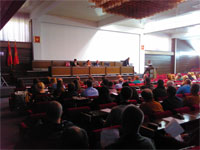 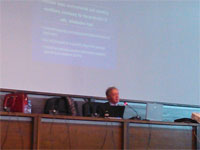
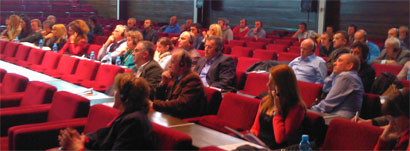
March 7, 2014
Announcement
Promotions of the Code for Good Agriculture Practices held in Montenegrin municipalities
As it was announced, in the period from February 12 to March 07, 2014, the Ministry of Agriculture and Rural Development organized promotions of Code for Good Agriculture Practices in Montenegrin municipalities, which was prepared as part of the MIDAS project.
Presentations of prepared material were held by earlier established schedule in the municipalities of Ulcinj, Podgorica, Kolasin, Berane, Bijelo Polje, Niksic and Pljevlja. Besides representatives from the Ministry of Agriculture and Rural Development, the materials were presented by employers of Extension Service for Plant Production and the Livestock Selection Service, from Biotechnical Faculty.
Beside representatives of institutions, participation of farmers from Montenegro to these promotions was significant, which was then used for their closer introduction with the recommendations of the Code as well as for preparation for future demands and conditions which they will have to fulfill, in order to preserve the environment and health and welfare of people and animals, also in order to respect the rules and use of various forms of support from national and international support programs.
These promotions were marked by active participation of agricultural producers and discussions with representatives of Ministry and departments, who gave kindly responses for relevant questions of producers.
Extension Service for Plant Production was its focus devoted to the importance of conserving soil by preventing the erosion and by increasing the organic matter. It was emphasized that water as an important resource should be protected from the increased concentration of nitrates originating from fertilizers, and that producers in an enclosed space should take care to properly use pesticides.
As for the area of cattle breeding, special attention was dedicated to recommendations for keeping animals, in a part number per unit area of the building, as well as proper disposal of manure.
Attention of producers was attracted by tips for proper use of fertilizers, manure storage in terms of capacity during the construction of buildings.
As we have previously mentioned, the adoption of these practices and recommendations by the farming community is a long process, which has started through MIDAS program of grants (compliance with the recommendations contained in the Code is mandatory for all users of MIDAS grants, who are supported within the Fourth Call for grants).
Printed copies of the Code were given to the present farmers at the end of all presentations. This manual is also available on the website of the Ministry of Agriculture and the MIDAS project
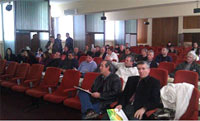 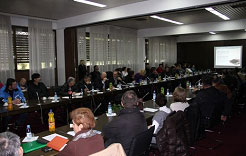
Presentation in Ulcinj, Feb. 12, 2014 Presentation in Podgorica, Feb. 13, 2014
Download Code for Good Agriculture Practices...
Download Presentation (Plant production)...
Download Presentation (Livestock)...
February 6, 2014
Held two-day workshop on "The role of technical bodies in the implementation of IPARD Programme"
Within the MIDAS project, on February 5 and 6, 2014, in Hotel Philia Podgorica was held a two-day workshop on "The role of technical bodies in the implementation of the IPARD Programme."
The workshop was opened by the Director of the Directorate for the payment of the Ministry of Agriculture and Rural Development Mr. Blagota Radulovic, while the workshop was led by the expert in this field Ms Maja Brajovik from the Paying Agency (Macedonia), together with colleagues from the Ministry of Agriculture and Rural Development of Montenegro.
In order to define the cooperation between Directorate for IPARD payments and technical bodies, through the World Bank project – MIDAS, MARD hired expert from Macedonia, Mrs Maja Brajovik, Head of Department for Internal Audit in the Macedonian Paying Agency in Agriculture. Ms Brajovik presented the criteria and requirements that have to be met by the future beneficiaries of IPARD funds. In addition, she also presented the legal basis for the implementation of the IPARD Programme, the role of technical bodies, the necessary documents that will be issued by technical bodies, as well as procedures for their issuance.
The first day of the workshop participants were representatives of all eight institutions that were appointed as technical bodies for the implementation of IPARD Programme’s measures by the conclusion of the Government of Montenegro in February 2013: the Ministry of Sustainable Development and Tourism, the Ministry of Labour and Social Welfare, Ministry of Health, the Veterinary Administration, Phytosanitary Administration, the Environmental Protection Agency, Directorate for water and Monteorganica. The workshop was attended also by the representatives of the Administration for inspection affairs competent for inspection affairs for the relevant areas such as: environmental protection, public health, animal and plant health, animal welfare and occupational safety. For successful implementation of the IPARD Programme it is necessary to recognize this Administration as a technical body, and define mutual obligations and establish the necessary procedures.
The workshop was attended by experts from the Netherlands, Lithuania and Estonia, which will conduct training for the technical bodies in the future within the Twinning project " Strengthening rural development Programme under IPARD in Montenegro". This workshop was a great opportunity to define the areas for which is necessary to carry out training of technical bodies in respect of the relevant EU standards that are expected in the upcoming years.
On the second day of the workshop participants were representatives of advisory services, those that operate at the national level (Livestock Selection Service and Extension Service for Plant Production), and municipal development agencies and services for agriculture. The role of advisory service in the process of achieving requirements of the technical bodies through established procedures is reflected in the timely provision of information and professional support to end-users, farmers and companies in this field in order to meet requirements in an appropriate manner and in a satisfactory timeframe.
  a.jpg)
|
|








|

















a.jpg)






